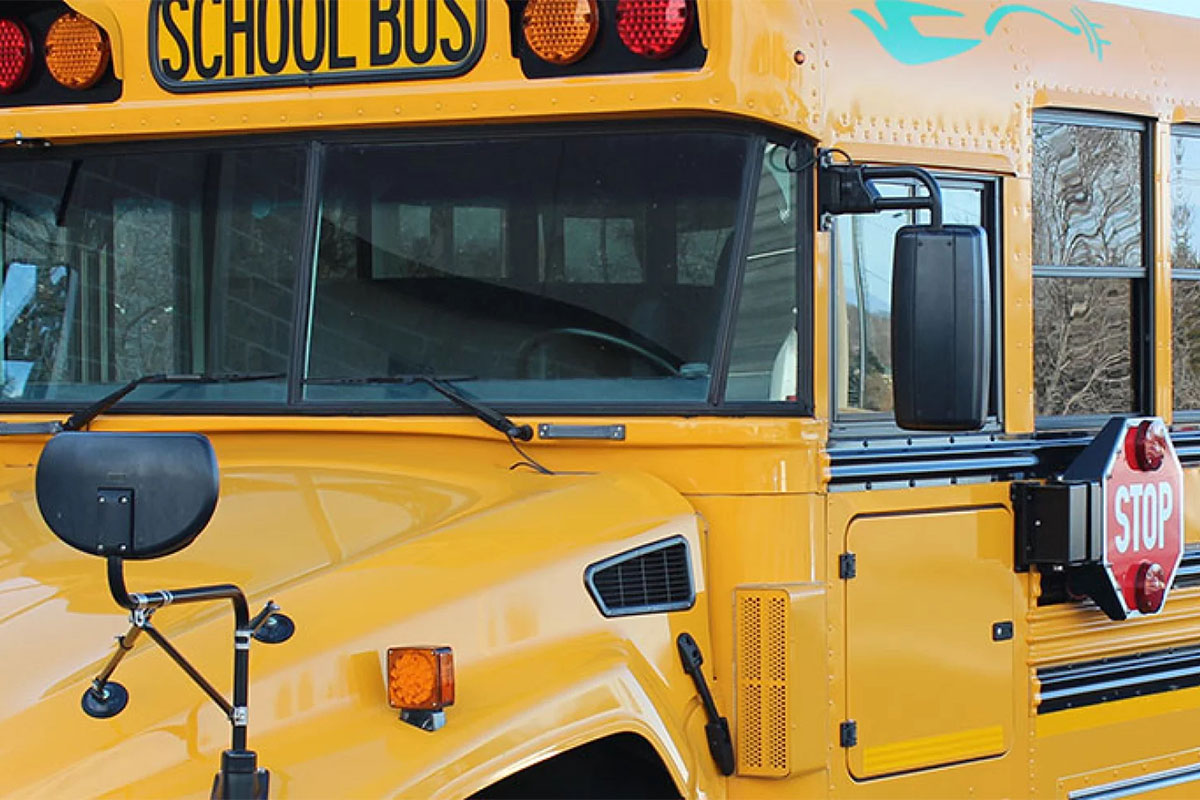Take a deep breath. For the one in 10 Mississippi schoolchildren who suffer from asthma, that’s not always an easy thing to do. But new federal funding for electric school buses could help them breathe easier—if our school districts choose to accept it.
Asthma, the most common chronic health condition in children, causes “flare-ups” of wheezing and difficulty breathing. Students with asthma are absent from school more than twice as often as their classmates, due to doctors/clinic visits, trips to the emergency department and hospitalizations.
One of the best ways to prevent asthma flare-ups is to avoid triggers such as pollen, dust, cigarette smoke and air pollution. And the buses that carry kids to and from school are a major source of the latter. The vast majority of school buses (95%) are powered by diesel engines that spew pollutants including carbon monoxide, nitrogen oxides, hydrocarbons, volatile organic compounds and particulate matter. These pollutants are linked to asthma and other respiratory problems as well as cardiovascular disease and cancer.
Children who ride school buses are especially vulnerable. Breathing in diesel exhaust from idling buses or riding inside older, poorly ventilated buses can trigger lung irritation and/or allergic reactions that cause asthma or make pre-existing asthma worse. Long-term exposures can increase the frequency and severity of asthma flare-ups.
Clean Electric Buses Make Economic Sense
One effective solution to this problem is to increase the number of clean, electric school buses. Last month, the Biden-Harris administration’s Environmental Protection Agency announced plans to do just that—by allotting almost $1 billion to the Clean School Bus Program, which will help 389 school districts across the country purchase more than 2,400 clean school buses. Rural, low-income and tribal school districts are prioritized for funding. The EPA is also partnering with the U.S. Department of Energy and Department of Transportation to provide technical assistance to districts that want to switch from diesel to electric.
| With funding from the Bipartisan Infrastructure Law, the EPA is investing $5 billion in low and zero-emission school buses over the next five years. Video courtesy U.S. Environmental Protection Agency/YouTube |
Nine (of 137) Mississippi school districts serving over 75,000 students are slated to receive $36 million in awards from the Clean School Bus Program in this round of funding. In fiscal-year 2023, EPA will make available another $1 billion in competitive grants for clean school buses. It is imperative that Mississippi school districts—with 50% of students living in rural counties requiring school bus transportation—take advantage of this funding.
Opting for electric buses makes good economic sense. Electric buses are not only cleaner than their diesel counterparts, they are also cheaper to maintain ($.19 vs $.82 per mile). This fact is not lost on the additional 10 school districts that have been awarded $7.3 million for 54 clean school buses through the State of Mississippi’s Volkswagen Environmental Mitigation Program.
While these financial benefits will accrue over the long term, we in the medical community expect to see health benefits right away—thanks to improved air quality and fewer asthma flare-ups. Those health benefits will be greatest in low-income households and communities of color, which bear the heaviest burdens from air pollution.
Mississippi has higher levels of particulate pollution than other U.S. states, and the problem is even worse in the districts that are eligible for clean school buses. These areas—where high rates of asthma and pollution go hand in hand—will benefit greatly from cleaner air. This is true in Mississippi, and it’s true for the nation as a whole. In fact, if we eliminated all fossil-fuel pollution in the United States, we could save 100,000 lives and $880 billion annually.

At the same time, reducing our use of fossil fuels will lower our emissions of greenhouse gases, which are heating up the planet. A hotter planet is dangerous to our health, as it causes extreme heat waves, droughts, wildfires, floods and hurricanes. Here in Mississippi, we are already coping with an increase in severity of hurricanes and other extreme weather events. A hotter future would also bring deadlier heat waves, rising coastal sea levels, longer mosquito seasons and catastrophic damage to fisheries.
Today, too many Mississippi school children struggle to breathe, and the buses they rely on can make the problem worse. I urge school districts to apply for and use funding from the Clean School Bus Program as one way to protect the health and well-being of our students.
It’s a win-win proposition. Switching to clean electric buses, school districts can save on transportation costs, reduce school absenteeism, improve health outcomes in our communities, and protect the planet. That way, we can all breathe easier.
This MFP Voices essay does not necessarily represent the views of the Mississippi Free Press, its staff or board members. To submit an opinion for the MFP Voices section, send up to 1,200 words and factcheck information to azia@mississippifreepress.org. We welcome a wide variety of viewpoints.






